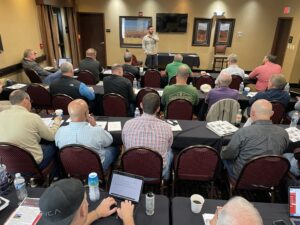
SANTIAGO, Chile (BP)–A light shining from South America is growing in intensity. It’s a flame of passion for dispelling spiritual darkness in the farthest reaches of the world.
The passion was evident as Baptist leaders from Ecuador, Peru, Chile, Bolivia, Argentina, Uruguay, Paraguay and Brazil met with Southern Baptist International Mission Board leadership for the first Accelerating World Evangelization Conference, Feb. 15-16 in Santiago, Chile.
The first of seven such meetings to be held this year with all the leaders of Baptist conventions and unions around the world, the conference sought to help South American Baptists and IMB leaders develop a shared vision for bringing the lost of the world to saving faith in Jesus Christ.
For many Latin American leaders, the conference was nothing less than historic.
“This was a significant event and we all felt the historical sense of this meeting,” said Brazilian leader Sostenes de Sousa, director of the Northeastern Baptist Theological Seminary in Salvador, Brazil, and former president of the regional Bahia Baptist Convention.
“In the past there was the feeling that the IMB told us what to do and how to do it. Now our relationship is moving to a partnership where we can sit down and talk as equals about how to fulfill The Great Commission.”
The South American Baptist leaders spoke freely with the IMB’s Jerry Rankin, Don Kammerdiener and Avery Willis about both their vision for reaching the lost and the obstacles to realizing that vision.
“We want to convert from being a missionary field to being a missionary force,” said Jorge Chiri, member of the Executive Committee of the Bolivian Baptist Union. “We currently have models that don’t work, but we have seen new methodologies here. I hope in 10 years we have put our history and heritage to good use.”
Some of the obstacles leaders addressed were their convention’s concept of church, the role of the pastor and the training of lay leaders for the work of the ministry.
“We have become known as a pastoral elite,” de Sousa said. “More than 90 percent of the pastors of our churches are seminary trained. We have taught that church takes place in a building and that our pastors are the only ones who can lead.
“We have got to teach our pastors a more biblical model of training laymen for the work of ministry. We must use biblical definitions to define church.”
“The challenge for us is to mobilize the church,” added Parrish Jácome, president of the Ecuador Baptist Convention. “The great problem is that the leaders of the convention and the pastors don’t understand what they are there for. The people must be involved in the work of the church, which is missions.”
Willis, the IMB’s senior vice president for overseas operations, believes addressing such topics is critical if Latin American Baptists are going to reach their potential for impacting lostness around the world.
“Their willingness to talk about the obstacles of requiring a building, requiring a seminary-trained pastor, an ordained person to baptize and to administer the Lord’s Supper shows a real maturity on their part and expresses the need they see to change the current structures,” Willis said.
“As one leader said, ‘Everything in the Bible is Baptist, but not everything Baptist is biblical.'”
Resources needed for Latins to become effective global evangelists can currently be found within the shores of the continent, said Alberto Haro, director of evangelism for the Ecuador Baptist Convention.
“We are rich with resources, human resources being our greatest asset,” he said. “I believe we can see the day when a unified force from this side of the ocean reaches around the world.”
Baptist partner groups worldwide are making strides in mobilizing their own people for global missions. In 1999, 47 conventions or unions reported 1,317 missionaries serving in other countries.
Recent organizational changes throughout the IMB missionary force have positioned missionaries to help Latin Baptists find their place in world evangelization.
“We are asking that a role of the missionary be in facilitating us and helping us teach how to spread the initiative toward a global missionary vision for the world,” said Federico Bertuzzi, director of International Muslim People, an Argentine organization that places Latin missionaries in Muslim countries.
“These men have great vision and our missionaries need to help strengthen and support these leaders as they make the changes necessary to realize that vision,” said IMB President Rankin.
It is the passion and vision the Latin American Baptists have for fulfilling the Great Commission that made the conference such a success, Willis said.
“I am so encouraged by their commitment and their passion to both reaching their countries and the other peoples of the world,” Willis continued. “They have a great desire to take the gospel of Jesus Christ to the Muslim world. I believe that in this century we are going to see Latins become very prominent in world evangelism.”
“I think what is awesome is that God has brought them right along to the same place that he’s been bringing us,” Rankin added. “It is nothing we can take pride in as a mission organization. It is thrilling to see that God has given them a passion for reaching the nations as well.”















